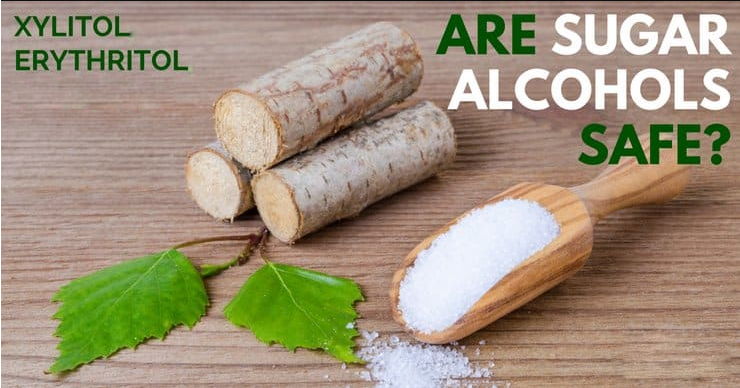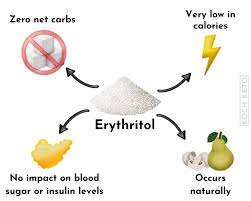Categories
- Blog (60)
Because sugar alcohols have the characteristics of low sweetness, low calorific value, good hygroscopicity, heat and acid resistance, long-term consumption without tooth decay, and will not cause blood sugar fluctuations in the human body after eating, low-sugar and sugar-free candies added with sugar alcohols Once launched, it quickly swept the world.
At present, the raw materials for the production of sugar-free candies are mainly sugar alcohols. The sugar alcohols that have been approved for inclusion in the edible hygiene standards in my country include isomalt, maltitol, sorbitol, xylitol, lactitol and erythritol.

Erythritol is a four-carbon sugar alcohol with a symmetrical molecule. It only exists in the meso form and exists in many microorganisms, plants and animals. It is a new type of natural sweetener popular in the 21st century.
Erythritol is white, bright powder or crystal with low hygroscopicity and moderate sweetness. It can be melted at 122 °C to form a colorless, non-viscous liquid.
Since the amount of erythritol entering the large intestine in the body is very small, it will not cause side effects such as diarrhea and flatulence that may be caused. Therefore, erythritol has a high tolerance and is moderately tolerated in sugar alcohols. The highest kind.

From the properties of erythritol below, we could see that Erythritol is as healthy as we imagined.
Pure sweetness:
Erythritol is very similar to sucrose in sweetness properties, clean and without bitterness. Mixing with other sweeteners such as aspartame, cyclamate, sucralose, etc. not only improves and harmonizes taste, but also has the advantages of synergistic increment and cost reduction.
High stability:
Erythritol is stable under heat, acid and alkali conditions, and the applicable acid-base range is pH 2 to 12, which meets the requirements of general food for acid and alkali.
Tests show that erythritol will not decompose and heat discoloration under the high temperature condition of 200 ℃, and avoid the coking of food during high temperature processing.
Low hygroscopicity, good crystallinity:
Erythritol bulk has low hygroscopicity, good crystallinity, and is easy to pulverize to obtain powdered products. Its hygroscopicity is the smallest among sweeteners such as sugar alcohols and sucrose.
In an environment with a temperature of 20°C and a relative humidity of 90%, the hygroscopic weight gain after being placed for 5 days is about 17% for maltose, about 10% for sucrose, and only about 2% for erythritol.
High heat of fusion:
The heat of dissolution of erythritol is -97.4J/g. Due to the large heat of dissolution, it will absorb more energy when dissolved in water, and has a strong cooling effect.
Experiments show that when 10g of erythritol is dissolved in 90g of water, the temperature drops by about 4.8°C, and the solid food and candy produced by adding it have a cool taste
Low water activity and high osmotic pressure:
Due to the small molecule of erythritol, the molecular weight is only about 1/3 of that of sucrose, which can greatly reduce the water activity.
25°C, 36% aqueous solution has a water activity of 0.91, while the osmotic pressure of bulk erythritol is high. The osmotic pressure of 20°C, 15% aqueous solution is 461.5KPa, which is 3.2 times that of sucrose, 1.8 times that of sorbitol, and erythritol. This characteristic of sugar alcohol is beneficial to improve the preservative ability of food and prolong the price period of food.
The World Health Organization and the United Nations Food and Agriculture Organization (WHO/FAO) Joint Experts on Food Additives (JECFA) approved erythritol as an edible sweetener in June 1999 without requiring ADI (tolerable daily intake) value.
The U.S. Food and Drug Administration (FDA) approved the Generally Recognized As Safe (GRAS) certification in 1997.
Powder erythritol’s special nutrition, functional properties and physical and chemical properties make it widely used, especially in the food industry as a diluent for low-calorie sweeteners and high-intensity sweeteners.
-Erythritol
-Monk fruit extract(Mogroside/Luo Han Guo)
-Stevia
-Xylitol
–Allulose
-aspartame
-Licorice
-Disodium glycyrrhizinate
-Malttooligosaccharides
-Lactose
-Fructose
Are you looking for any sweeteners? Welcome to send us an inquiry about our sweeteners at [email protected].